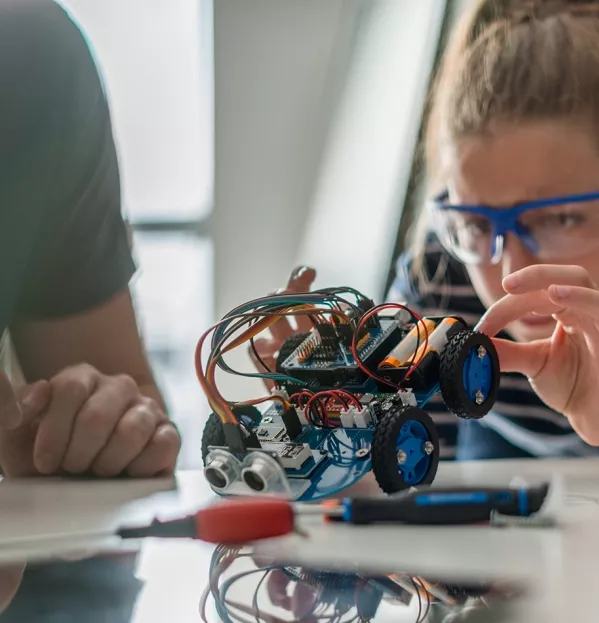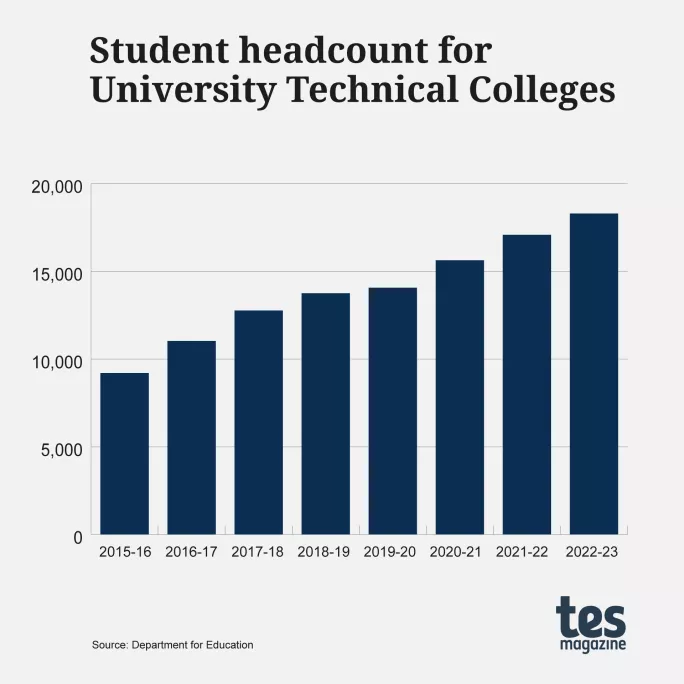Could a ‘UTC Sleeve’ bring more vocational strands to state schools?

“If you visit UTCs in September and talk to young people who have just joined and ask them about their background and their experiences, you will find they are much happier [than at school].”
Simon Connell says this has been a consistent finding across his eight years at Baker Dearing Educational Trust, which supports University Technical Colleges (UTCs) delivering T levels, Btecs and other vocational qualifications while working with universities and local businesses.
The number of students in UTCs has doubled since he started working with Baker Dearing in 2016 (he became CEO in 2019), from 9,000 then to around 20,000 this year. And it is the shift in the tone of the education that he says appeals to UTC students.
“Our students like being in an adult environment,” he explains. “They like the fact that they’re treated like adults [and] they like the fact that employers are in the building.”
Connell believes the latter ensures education remains relevant to the students, arguing that a more academic diet in secondary education is not suitable for some students, so access to UTCs and their more technical courses is vital.
“Many of the [students] don’t see the point in learning irregular French verbs, but when you talk to them about careers in engineering, and what that might mean, it engages their enthusiasm,” he says. “[But] not every student comes because they are super keen on the specialisms, they come because they want choice and they want to change and they’ve realised the system isn’t working for them.”
What’s next for UTCs?
It was not that long ago that criticisms of the effectiveness of UTCs were being highlighted by a 2019 report by the National Audit Office (NAO). One major concern was centred around Ofsted inspection outcomes. At the time of the report, 52 per cent of UTCs were graded “good” or “outstanding”.
Today, that figure has risen to 84 per cent.
“We are now in a position where it could be argued that the UTC programme has come of age with regards to our student growth, quality of student labour destinations and high percentage of ‘good’ Ofsted gradings,” Connell says.
Another concern raised related to student numbers, with the 2019 report noting that only 13,572 students were enrolled in UTCs - only 45 per cent of the capacity of the UTC system at the time.
One of the recommendations suggested targeting younger pupils and that is something Baker Dearing did - with notable success; the most recent Department for Education data shows the number of pupils in Years 7, 8 and 9 enrolling in UTCs has risen from just two in 2015-16 to 2,899 in 2022-23.
Meanwhile, the growth of key stage 4 students has risen from 4,728 to 8,479 and KS5 from 4,473 to 6,919.

So, what’s changed to drive better results and student numbers?
“Over a short period of time, we had lots of UTCs all over the country, and we did that to try and get blanket coverage,” he explains.
Connell acknowledges that “inevitably when you do things quickly, you don’t get everything right the first time” and that is why “it’s taken a while for students to understand the offer”.
He adds that it has taken parents some time, too.
“Education is very risk averse,” he says. “No parent wants their child to move school unless they feel confident that moving is the right thing for them. Therefore, we have had to wait to build the reputation that we have today.”
That growth also means two new UTCs have been slated to open in Doncaster and Southampton - a notable change in trajectory given that 10 UTCs had closed by the time of the NAO report in 2019.
Connell describes this announcement as the “proudest moment of my career” and calls it a “stamp of approval” from the DfE.
However, even with this growth, Connell acknowledges UTCs still “only support about half a per cent of young people in secondary schools” - something he’s keen to increase.
“The question is, how can we allow more young people to gain access to what we do? We think a UTC model is a really valuable education for young people,” he says. “It’s not right for everyone, but there are a lot of young people it’s absolutely right for.”
The UTC Sleeve
The simple idea on paper would be to build more UTCs, but Connell acknowledges a lack of funding means this is unviable. Instead, a different plan is needed.
The idea instead is that a UTC will be created within a secondary school and referred to as a UTC Sleeve. It would offer vocational courses like a main UTC, but run alongside academic options, too, such as English and maths GCSE, and other options such as music, art or a humanities subject.
There are two main benefits of a UTC Sleeve, says Connell.
“Firstly, the students are already there and therefore are familiar with the teachers and the rules and the expectations, and there are no geographical or transport barriers preventing attendance.
“Secondly, it’s cheaper to deliver than building a new school - yes, it does require some capital, and it does require workshops and specialist equipment, but it’s less expensive than a brand new provision.”
A frontline experience
Baker Dearing has tested this model at Abbeywood Community School in Bristol, part of the Olympus Academy Trust, where headteacher Benjamin Dilley says it taps into a clear need for many students to have other options beyond just academic outcomes.
“It is imperative that we future-proof our curriculum, work with the local community and continue to offer a pipeline of talent to the economy,” he says.
To this point, the UTC Sleeve on-site offers engineering qualifications alongside a traditional curriculum.
“We have 90 students in Years 10 and 11 who have opted to take what we have called ‘the engineering pathway’,” explains Dilley.
The pathway is an engineering-centred curriculum sponsored by the University of the West of England, Rolls-Royce, Airbus and GKN Automotive. It offers two options of study.
“Students study for a Cambridge National qualification in engineering, in either double or triple award, plus a further 50 who have elected to take a single award Cambridge National in engineering alongside their other subjects,” says Dilley.
Students access the specialist kit and teaching needed for their engineering courses in the Engineering Centre at the school. Dilley says this was an investment made by the school, and he hopes to add to the facilities as the programme grows.
Connell says the growing interest in the UTC Sleeve at this school proves there is an appetite for an alternative to the current academic diet pushed in schools.
“It’s great to see so many students signed up and benefiting from the programme - especially when we know these students may have struggled to find a course that suited them had the UTC Sleeve not been there.”
The rollout
Connell says one outcome he hopes from this pilot is that it will allow more UTC access in “cold spots” where students have no realistic prospect of attending a UTC.
“This model is very appropriate for Hastings or Blythe, or coastal areas that need something like this but can’t justify building a new school based on their demographics,” he says.
Connell is itching to start doing this on a grander scale and is confident there is pent-up demand for this: he says leaders at multi-academy trusts (MATs) are keen to get a UTC Sleeve on-site at their schools.
“I’ve been astonished at how many MATs and schools have approached us about adding a UTC Sleeve to their school,” he says. “Almost every other day, I’m getting an email from somebody asking for more information.”
Pressing ahead
That increase will require funding, though - something Connell says he thinks could come from money the government has allocated for T levels.
“There’s a lot of money available for T levels that allow schools to invest in specialist equipment,” he says. “One of the things that have worked well with UTCs is the access to industry-leading equipment. And that’s not just machinery but 3D printers, and software for creative designers.”
Connell says the case for this has been made to the DfE and is ”currently with the secretary of state”.
Tes asked the DfE for its view on funding for the UTC Sleeve programme, a spokesperson said: “UTCs play an important role within our education system, supporting young people to build the skills they need for their future careers.
“We continue to have productive discussions with the Baker Dearing Trust on ensuring technical education delivers the skills employers need.”
For Connell, though, even if that support is not forthcoming, he hopes schools and trusts will see it as a worthwhile investment and fund it themselves, like Abbeywood Community School in Bristol.
The future of post-16 education
Of course, any talk about vocational qualifications and their future though cannot avoid the elephant in the room - how the surprise announcement of the new Advanced British Standard (ABS) may impact their delivery, especially T levels.
Connell says he is “intrigued” by the announcement of the ABS, and says it is “surely the most significant post-16 education reform in the 13 years of Conservative-led government”.
“[Introducing the ABS] will also be the most enthusiastic effort to date at creating parity of esteem between academic and technical education,” he adds.
Connell is keen that any change shouldn’t move too far away from the current vocational options.
“The new ABS should not dilute the distinctive features of T levels,” he says. “It is vital we do not lose the industry placement, which is part of the T level valued above all else by students and employers.”
However, while Connell could understandably be concerned the ABS model could subsume the work UTCs do, he believes it helps place the work UTCs are doing front and centre, not least by showing how secondary schools could become more vocationally-minded.
He says: “The government has cited the education models of many European countries as proof we need the ABS [because] a key feature of those countries’ models is technical education from the ages of 13 or 14, which has become a rarity in the UK.
“That form of high-quality, employer-led technical education from an early age is best delivered by UTCs and UTC Sleeves.”
For the latest education news and analysis delivered directly to your inbox every weekday morning, sign up to the Tes Daily newsletter
You need a Tes subscription to read this article
Subscribe now to read this article and get other subscriber-only content:
- Unlimited access to all Tes magazine content
- Exclusive subscriber-only stories
- Award-winning email newsletters
Already a subscriber? Log in
You need a subscription to read this article
Subscribe now to read this article and get other subscriber-only content, including:
- Unlimited access to all Tes magazine content
- Exclusive subscriber-only stories
- Award-winning email newsletters
topics in this article



